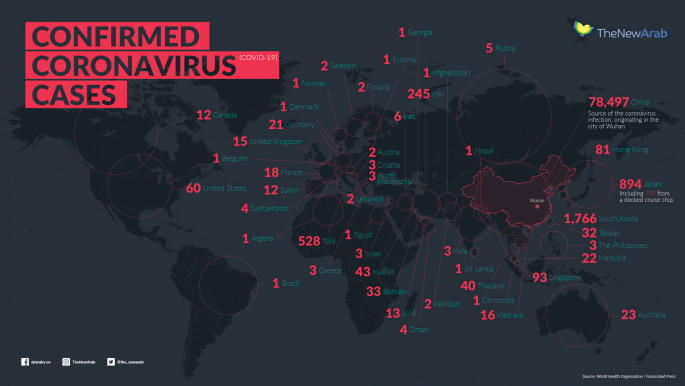Iran's coronavirus death toll rises as Iraq reports first case in Baghdad
Iran's official IRNA news agency reported an increase in deaths from 19 to 26, agencies have reported, with the total number of coronavirus cases in the country now at 141.
The virus has so far spread to 20 of Iran's 31 provinces, the agency reported.
Iraq's latest case of COVID-19 was reported in Baghdad, taking the country's total number of cases to six. The man contracted the virus in Iran, Reuters reported.
Iraq's health minister said the man was in a Baghdad hospital in "good health".
Iran has emerged as a major hotspot in the region, with 22 fatalities from 141 infections - the highest death toll outside China, where COVID-19 originated.
The virus has spread to more than 30 countries, killing over 2,700 and infecting 80,000, mostly in China. But new outbreaks in Europe, the Middle East and in Asia have fanned fears of the contagion taking hold in poor nations which lack the healthcare infrastructure to cope.
Travel restrictions
Iranian authorities on Wednesday announced domestic travel restrictions for people with confirmed or suspected cases of the novel coronavirus. The authorities also slapped curbs on visits to major Muslim pilgrimage sites.
"Instead of quarantining cities, we are going to implement movement restrictions for those suspected of infection or those infected," Health Minister Saeed Namaki said at a news conference.
He said teams of inspectors had already been placed at the entrance of cities "that see a lot of movement", without naming them.
Read more: How the Middle East is dealing with coronavirus
The teams will take people's temperatures and stop those who are infected or suspected of infection, who will be quarantined for 14 days.
Namaki said access to several Shia holy sites would be restricted, including the Imam Reza shrine in Mashhad and the Fatima Masumeh shrine in Qom.
|
|
Iraq introduced similar measures Wednesday, banning public gatherings and adding Kuwait and Bahrain to the list of countries from which it is barring entry.
Iran announced its first two deaths from the coronavirus last week, in the Shia holy city of Qom - a key centre for Islamic studies and pilgrims from abroad.
Among those who have tested positive for the novel coronavirus are Iran's deputy health minister and a prominent reformist politician.
Fears over cover-up
International health experts have expressed concern about Iran's handling of the outbreak, while critics of the government have speculated Tehran is covering up the true number of fatalities.
An Iranian lawmaker hailing from Qom earlier this week alleged that 50 people had died from the virus in the city alone.
|
Such worries mounted on Tuesday when the head of the taskforce combatting the virus, Deputy Health Minister Iraj Harirchi, admitted he himself had been infected.
But health ministry spokesman Kianoush Jahanpour said Wednesday that the situation was "improving", even as he announced four more deaths and 44 new infections including in six previously unaffected provinces.
Paris-based media watchdog Reporters Without Borders (RSF) on Wednesday said that Iran "seems to be concealing information about the epidemic in line with China's example".
It condemned what it termed "Iran's persecution of media outlets and journalists publishing independent information".
"Respect for the public's right to full, independent, diverse and quality news reporting... is the best way to protect the population and combat rumours," said Reza Moini, head of the group's Iran desk.
A day earlier, US Secretary of State Mike Pompeo accused Iran of concealing the full extent of the outbreak, saying "Tehran may have suppressed vital details".
But the Iranian health ministry's spokesman appeared optimistic on Wednesday about the situation in the worst-hit province of Qom, despite its spread across the Islamic Republic.
"Every 24 hours, at least 10 percent of those hospitalised or suspect cases are discharged with good general health," the official said.
Follow us on Facebook, Twitter and Instagram to stay connected





 Follow the Middle East's top stories in English at The New Arab on Google News
Follow the Middle East's top stories in English at The New Arab on Google News
![Israeli forces ordered bombed Gaza's Jabalia, ordering residents to leave [Getty]](/sites/default/files/styles/image_330x185/public/2176418030.jpeg?h=a5f2f23a&itok=_YGZaP1z)

